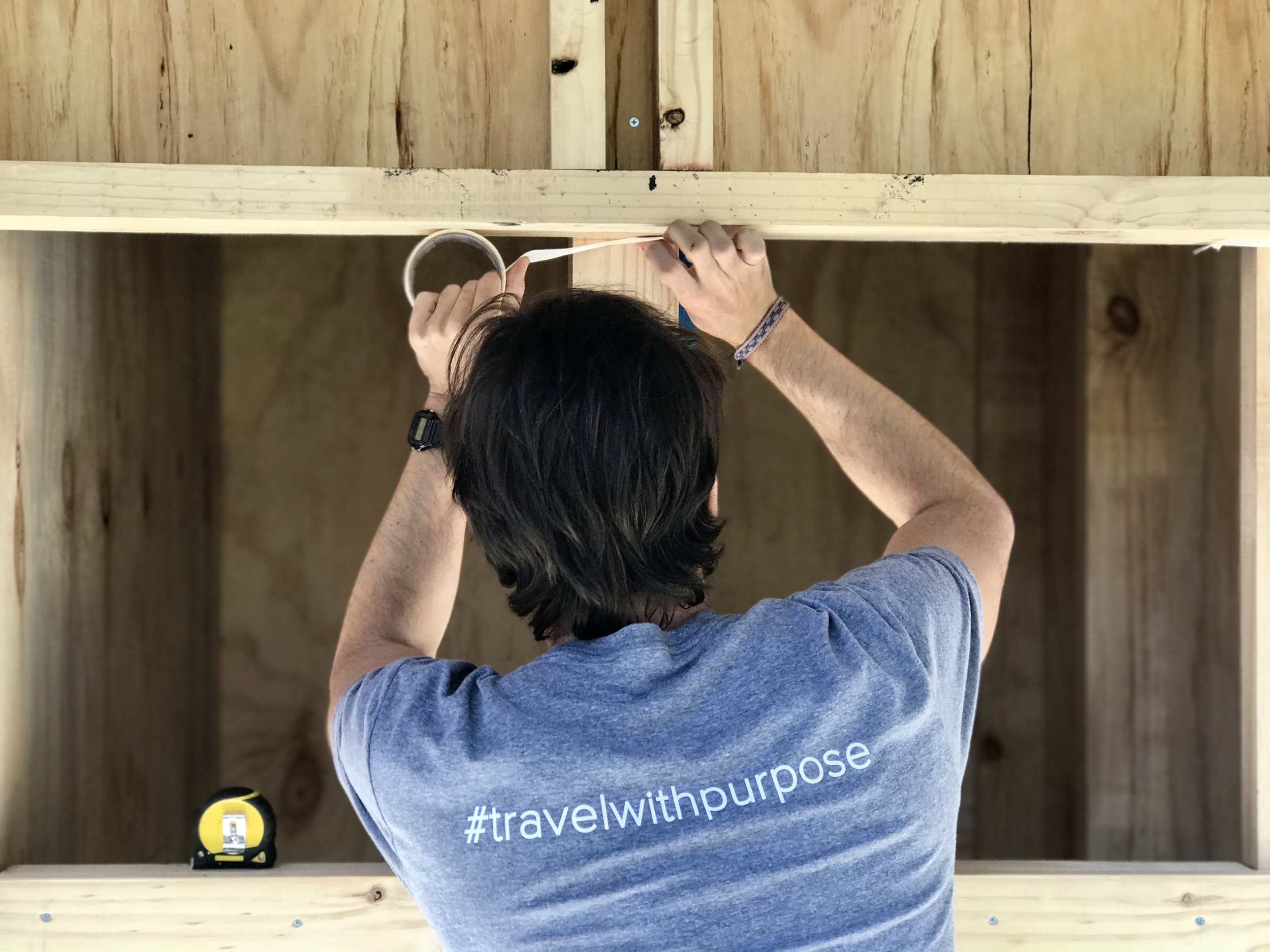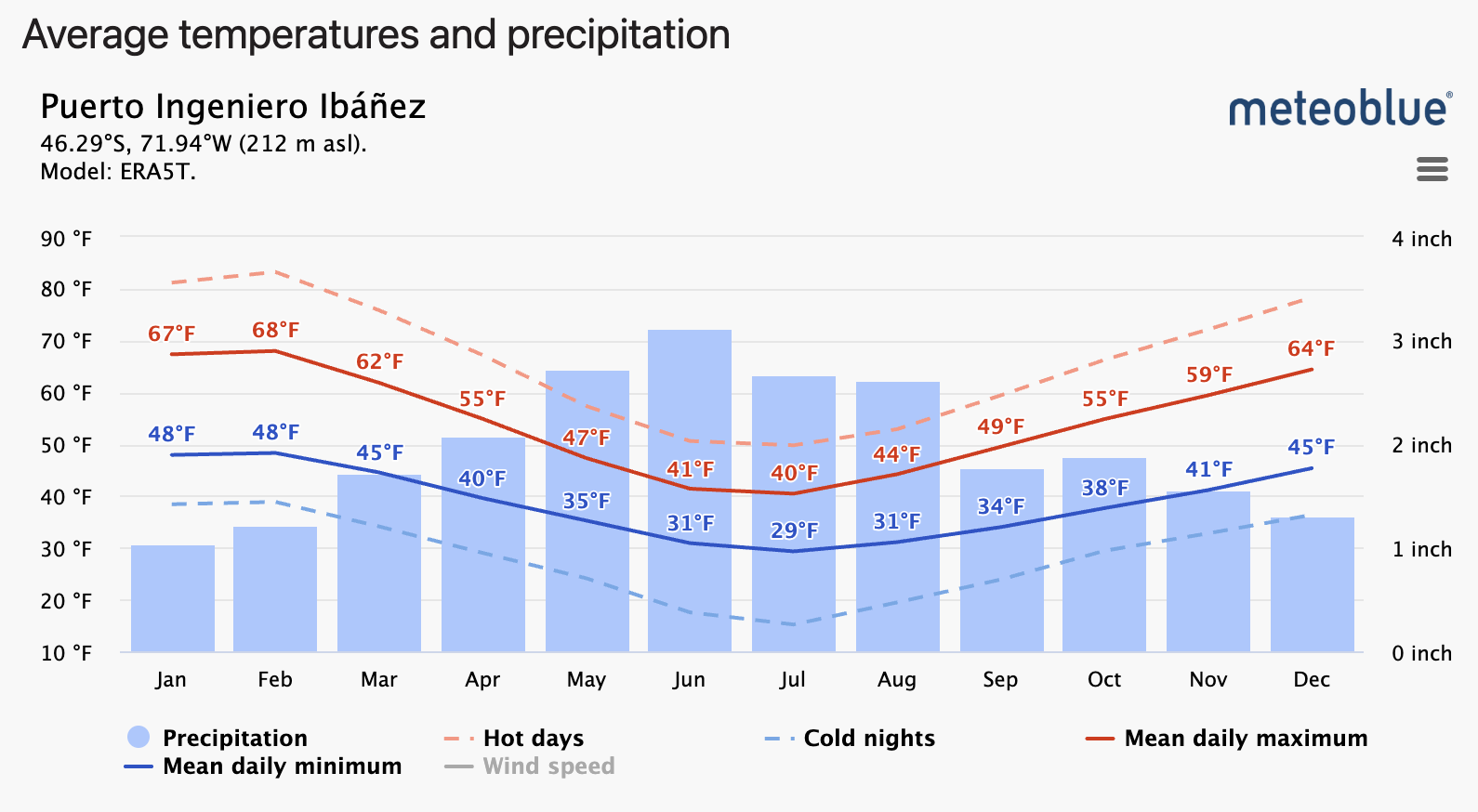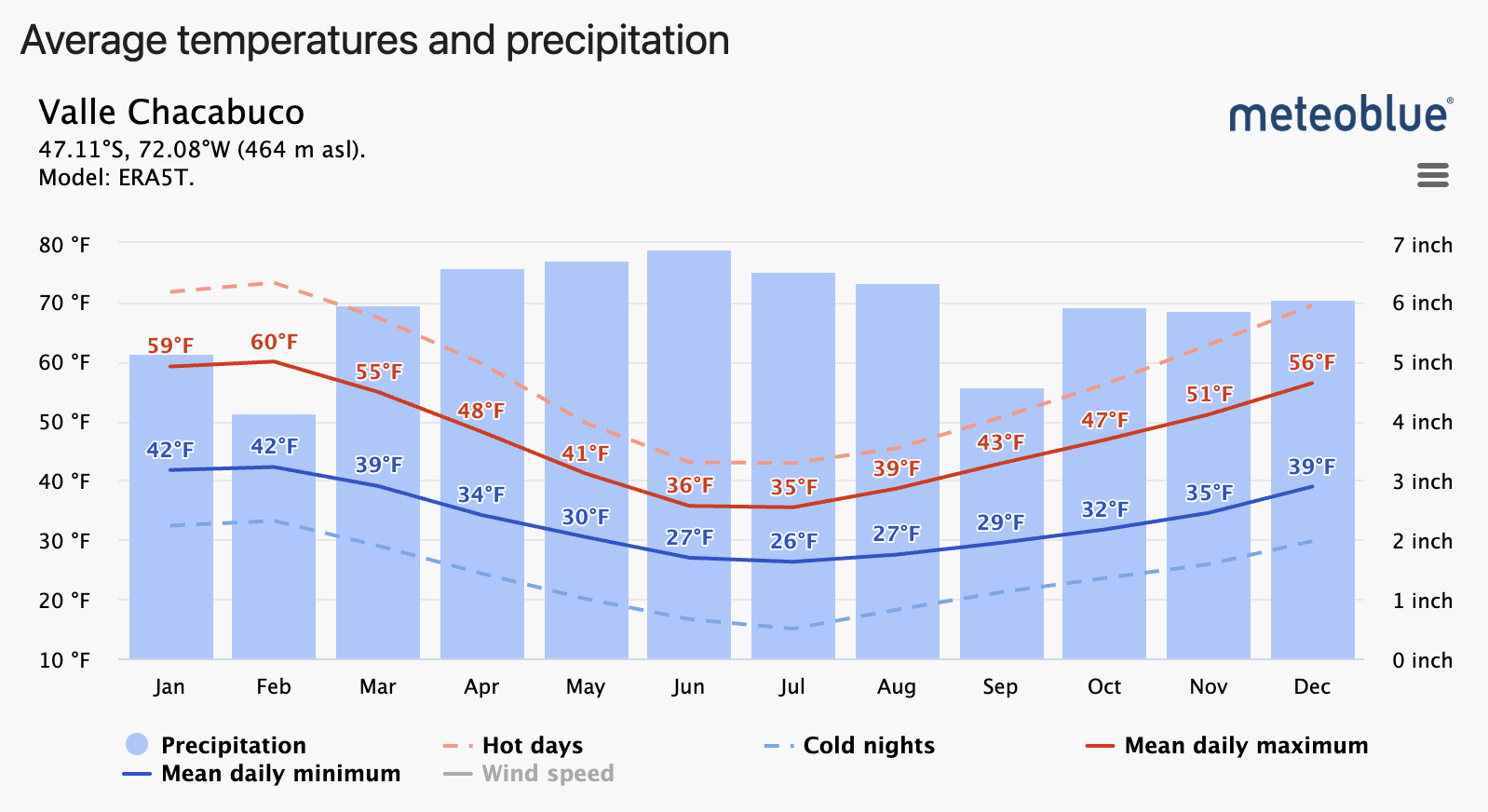Preparing for Patagonia
DESTINATION
Start/End Location: Coyhaique, Chile 🇨🇱
✈️ Airport: Balmaceda (BBA)
Project Site: Puerto Ingeniero Ibáñez
Trekking: Patagonia National Park
ACTIVITIES
Build infrastructure for organic gardens/greenhouses and host community workshops
Self-supported backpacking (medium difficulty)
Permaculture lessons
Farm-to-table meals & Patagonian asado (barbeque)
Project Days: Volunteer Work
WHAT KIND OF VOLUNTEER WORK WILL WE BE DOING?
Your economic contribution to the small communities in the Aysén region goes a long way. At our project site, you get to roll up your sleeves to build/maintain/beautify community-based storage centers for inorganic recyclable waste, as well as dig your hands into gardens and manage organic waste in a centralized location in the villages. We will visit schools and collaborate with students and local committees to integrate educational programs related to environmentalism and facilitate logistics, in special partnership with local NGOs.
All equipment and tools related to the build projects are provided. Be prepared to dress according to any potential weather changes, including sun, rain, and wind; e.g. closed-toe shoes, sunglasses, hat, rain jacket, long pants, etc. Before starting the volunteer work, your Trip Leader will give a safety briefing highlighting the potential hazards on site.
Touring the Land
LANDSCAPE & CULTURAL TOUR
As we make our way through the region via the famous Carretera Austral (Route 7) highway, we will exercise sustainable travel practices along the way.
As we trek through national parks and reserves, we will practice “Leave No Trace” principles by picking up trash in our surroundings and leading by example. We’ll pitch tents in established camping areas and gain a deep appreciation for the untouched natural beauty and wildlife around us. We are committed to embodying conscious travel.
Further, we’ll connect deeply with locals and immerse in their daily ways of life, and spend quality time with patagones.
TRANSPORTATION
Our program includes some days of driving over many kilometers across the region, to land us at our destinations for project volunteer work and backpacking.
You will have the opportunity to experience various forms of motor- and human-powered transportation. Our road trip tour will usually be via a large van or small bus, with stops for breaks as needed. Although road conditions are decent (some asphalt and mostly maintained gravel), trips can be long over bumpy/winding roads, so we recommend bringing remedies for motion sickness if you are susceptible.
Please note that wearing a seatbelt is mandatory in Chile.
A TYPICAL DAY SCHEDULE
7:00 AM Wake up and pack bags
8:00 AM Breakfast
9:00 AM Depart to activity/trekking
1:00 PM Lunch
2:00 PM Depart to next activity/trekking
6:00 PM Arrivate at evening destination; “tea” time (called once in Chile); settle in
7:00 PM Dinner; evening activities/relaxation
The fun doesn’t end when we settle into camp! There will be time to mingle with locals, play games, and take photos at nearby landscapes. Feel free to bring games, instruments, hobbies, speakers, etc. to share the joy!
OUR GUIDING STAFF
Our friendly team of trip leaders and trekking guides will lead us along our tour and facilitate our needs for all activities. Each group will have a wilderness/mountain-certified and English-speaking guide to lead the way safely and securely.
Q: What happens if I get sick or there is an emergency?
A: If there is an emergency during our trip, your first point of contact should be the trip leader and trekking guide. The guide is there to support you and has the relevant safety training. If needed, the guide will arrange any necessary medical response and the trip leader can support in confirming your travel insurance coverage.
ACCOMMODATION AND SHOWERS
Accommodations are on a shared basis. In Coyhaique and our project sites, you will be staying in hostels with shared bedrooms and bathrooms. Laundry services are available in Coyhaique for about $7-9 per load.
As we embark on our multi-day trek into nature expect typical camping in your own tent, without showers. In the national park grounds, there are dry compost toilets. In the backcountry, we will provide a trowel to properly manage poop in the ground. There are sometimes (chilly) rivers to wash in, and we may be able to have a bonfire only if we’re not in a national park.
Bring quick-dry towels/cloths for body and dinnerware—please avoid disposable wipes, as to minimize waste. Note that what you take in, you must take out!
ELECTRICITY AND DATA SERVICE
The voltage in Chile is 220 V and the plugs used are C or L. Bring your universal travel adapter—plugs from USA/Canada are not accommodated!
There will not be electricity available while trekking. Please come prepared by bringing a portable battery bank, fully charged headlamp/flashlight, extra camera batteries, and/or a portable solar panel.
For cellular network service, if you choose to use a local or international SIM card you will have minimal coverage on some—but not all—parts of the region. You can purchase a prepaid local SIM card (we recommend Entel or Movistar), in which you can recharge the balance at grocery and convenience stores.
WiFi is available in cities such as Coyhaique but typically not in small villages (such as our project sites and farms).
FOOD AND WATER
Fresh, local, and organically grown vegetables will be a staple part of our meals, as we promote local permaculture farms.
Along the road trip, we will dine at eateries with omnivorous options for your choosing. While trekking in the backcountry we’ll each carry part of our group rations and cooking equipment to prepare nourishing meals together.
For breakfast, bread with simple toppings—such as eggs, jam and butter, cheese, and avocado—form the basis of Chilean desayuno.
During our farm stay at Alma Verde Permacultura, we’ll experience the joy of farm-to-table meals made from organic veggies, eggs from happy chickens, homemade marmalade, ferments, and fire-baked sourdough bread.
If you have any special dietary restrictions or allergies, please let us know in the trip signup form so that we can make adequate preparations for you. Note that by default, our daily meal plans accommodate a vegetarian/vegan diet—with the exception of a meat-focused asado—, in which you are welcome to supplement with your own additions by your own means. Gluten-sensitive diets can also be accommodated, though limited Patagonian availability means that options are less abundant or creative than you might be used to.
Though all food is covered on the trip, we encourage you to bring your own snacks and comfort foods for variety—there will be opportunities to shop at small markets.
Because Patagonia boasts some of the purest glacial water in the world, we recommend drinking the tap water. Please note that drinks and alcohol are not included in the coverage and that the legal drinking age in Chile is 18 years.
Fresh water from many Patagonian streams are some of the purest in the world and can be drunk directly! However, we encourage you to bring your own water filter if you are sensitive. We do not recommend purchasing bottled water in the region, as local potable water is excellent and recycling processes are limited.
WEATHER AND PROTECTION
The sun is serious in Patagonia with UV levels consistently medium or high! Use as much sun protection as possible; e.g. SPF 40+, large-brim hat, buff, UPF clothes, and 100% UV protection sunglasses.
Patagonia can experience four seasons in a day!
Temperatures can drop below 0°C (32°F) at night on a whim, even in summer. Rain is a norm, as are warm sunny breaks, but in general, the weather is cool for avid hiking.
Below is the average monthly temperature and precipitation in both Puerto Ibáñez and Valle Chacabuco (Patagonia National Park), where we will spend a good amount of time outdoors volunteering and/or trekking.
Volunteer site: Puerto Ibáñez, Chile. (Source: MeteoBlue.com)
Trekking: Patagonia National Park (Valle Chacabuco), Chile. (Source: MeteoBlue.com)
Getting Equipped and Ready
LUGGAGE AND LOGISTICS
TRAINING FOR THE TREK
Prepare yourself for walking 5-7 hours a day on the trek with a weighted backpack of ideally no more than about 25% of your body weight.
To maximize your enjoyment on the trip, plan an exercise program that trains you for endurance hikes well in advance before you go. Brisk walks are a good start, building up to include long walks up and down hills while wearing your hiking boots and backpack.
Whenever possible, take the stairs to train for ascents/descents and seek out exercise programs that build up your cardiovascular strength and endurance.
WHAT TO WEAR AND PACK
We’ve curated a list of items we recommend that you pack for our trip in Patagonia:
Planning on picking up gear? Check out our special Trek Relief branded items! (All proceeds go towards furthering our mission ☝️ so you can #purchasewithpurpose)
As space is limited for the road trip, please consider carrying only what’s necessary. You can leave items in storage at our hostel in Coyhaique.
Q: Where can I pick up extra gear/items before we start? A: In Coyhaique, there are plenty of outdoor gear shops, pharmacies, and supermarkets to stock up on what you may be missing. There is also a Patagonia Inc. clothing store—the only Patagonia store in Patagonia!
Q: For the trek, do I have to carry everything from one campsite to another?
A: Yes. As a group, we will also evenly distribute food and cooking equipment to each person, so please ensure extra space in your backpack.
HIKING WITH A LOADED BACKPACK
The physical activity level of our Patagonia trip is moderate, as we will embark on self-supported backpacking:
3-day trek: 6-10 miles per day with moderate elevation gain (500-1,600 ft)
There is a local term called “Patagonian flat” which indicates that you can expect at least undulating landscapes, if not lots of uphill climbs and downhill descents. TLDR: It’s not flat!
Medium backpack load:
50-70 L backpack designed for backpacking (including hip & chest straps)
plus waterproof liner/cover
25-40 lbs packed weight
Hiking essentials: water bottle, rain coat, hat, sunscreen, snacks
Camping essentials: personal tent, sleeping bag & pad, clothes, headlamp, toiletries, dinnerware & utensils
Group items: shared food, cooking equipment
Travel Considerations
VISA AND ENTRY
Citizens of USA, Canada, and many EU countries do not need a visa if visiting for fewer than 90 days, but your passport must be valid for at least six months beyond your date of arrival.
As entry requirements often change, please confirm before your departure: https://www.chile.travel/en/traveltochileplan
When you first enter Chile, you will be processed through their customs & immigration department by the PDI (Policía de Investigaciones de Chile). You will be issued a paper slip which must be shown with your passport when exiting the country. Do not lose this paper! See an example PDI slip here.
CITY TRANSPORT
To and from the airport (BBA), we recommend using an airport transfer service such as Transfer T y T or Transfer Velásquez to safely and securely get you to the hostel for about US$10. You can book upon arrival at the airport counter at the baggage claim area or in advance via WhatsApp. You simply walk out to the curb to the shuttles and present your ticket with lodging name.
In Coyhaique, expect to get around mostly by foot. Our hostel is in a central location, which is a short walking distance to most amenities, cafes, and restaurants. For further excursions, taxis are available.
MONEY AND TIPPING
Local currency is the Chile Peso (CLP).
In cities and villages, foreign credit cards are accepted at most establishments.
In street markets, cash is king. ATMs and money exchanges (for USD/EUR only) are readily available in cities and airports, but be wary of transaction/exchange fees.
A service gratuity (propina) of 10% is almost always requested at restaurants, and is optional but is the norm for acknowledging good service.
For our tour operator (guiding and cooking staff), a propina of US$75-$150+ is recommended to acknowledge the personalized service of our close-knit team.
Your trip leader will anonymously collect everybody’s contribution and present it to the tour operator.
Note that bargaining is not the cultural norm in Patagonia.
CULTURAL AWARENESS
COMMUNICATION
Of the Latin American countries, Chile is unique in their version of Spanish. Take note of the nuances of Chilean Spanish, of which it is accented distinctively, with final syllables and “s” sounds dropped, and soft pronunciation of some consonants. Prepare yourself with their famous abundance of slang words, known as “chilenismos.“
GREETINGS
When meeting and greeting, Chileans are often warm and look for reciprocation from visitors. Common greetings include a handshake, pat on the back, or a kiss on the right cheek. Visitors should greet the head of the household or a senior individual first.
Saying hello — Hola | Buenos días | Buenas tardes | Buenas
Parting / saying goodbye — Chao | Nos vemos | Hasta luego
Giving thanks — (Muchas) gracias
Expressing deliciousness —(Muy) bueno | ¡Qué rico! | Buenísimo

















